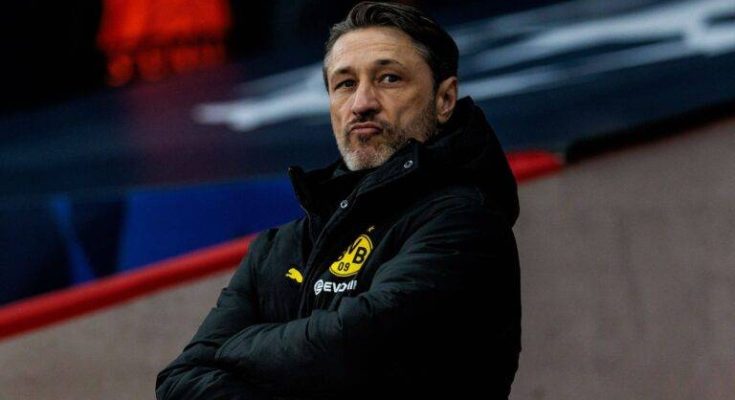Dortmund, Germany – 23. September 2025. In a bang that shook the football world, the new era of Borussia Dortmund under Niko Kovač took a dramatic twist as the coach suspended two players despite securing a narrow 1:0 victory. For many, the news was not just surprising but downright shocking, as most fans would normally expect such disciplinary measures after a loss, not following a hard-earned three points. Yet for Kovač, whose strict approach to professionalism and accountability has already been making waves since his appointment, this decision appears to be a statement of intent – a clear signal that winning alone is not enough if standards are not being upheld both on and off the pitch.
The match itself seemed ordinary from the outside, a gritty Bundesliga clash where Dortmund eked out a slender win. The scoreline did not fully reflect the intensity of the game, but in the end, the three points were secured. For the supporters, it was another step in what they hoped would be a season of consistency, especially after years of near misses in both domestic and European competitions. However, within hours of the final whistle, the news broke: Kovač had suspended two first-team players due to what he described as “unacceptable” behavior. The coach refused to water down his stance, and his choice of words carried a tone of finality, emphasizing discipline over reputation, results, or convenience.
For Dortmund fans, the immediate question was: what exactly happened? Reports suggest that the incident was less about the match itself and more about the players’ attitude. Kovač is known for demanding total commitment in training sessions, team meetings, and on matchdays. His philosophy revolves around discipline, unity, and respect, values he has carried with him since his successful days at Eintracht Frankfurt and Bayern Munich. The Croatian coach has built his reputation on structure and order, often described as a manager who would rather lose with disciplined players than win with chaos in the locker room. In this case, the problem seemed to stem from breaches of internal codes, which for Kovač are non-negotiable.
The suspended players, though unnamed officially at first, were reportedly key figures in the squad. This only added to the controversy, since sidelining important names could impact Dortmund’s immediate prospects in the league and upcoming Champions League fixtures. Fans debated whether the decision was too harsh, especially given the positive result on the pitch. Some supporters argued that Kovač was right to act swiftly to set a precedent, preventing future problems that might arise if players thought they could bend the rules. Others worried that such strictness might destabilize a team that has historically struggled with consistency, potentially leading to divisions inside the dressing room.
The media reaction was instant and widespread. Newspapers and online outlets across Germany and Europe picked up the story, highlighting the tension between short-term success and long-term stability. Commentators pointed out that while Jürgen Klopp and Thomas Tuchel had both stamped their authority at Dortmund in the past, rarely had a coach taken such a bold stance so early into his tenure, especially after a win. For Kovač, however, it appears that his objective is bigger than immediate applause. He wants to reshape Dortmund into a club where internal culture is as strong as tactical prowess.
This situation also puts the spotlight on Borussia Dortmund as an institution. Over the years, the club has developed a reputation for nurturing young talent, selling stars for big fees, and competing admirably in the Bundesliga despite Bayern’s dominance. But in recent times, criticism has mounted that the squad has lacked maturity and leadership, sometimes losing focus in crucial moments. Kovač’s decision might therefore be interpreted as an attempt to instill a more ruthless mentality, one that closes the gap between Dortmund and perennial champions Bayern Munich. To do this, discipline off the pitch must equal ambition on it, and no player can be exempt from the rules.
Reactions from within the club remain guarded. Officials close to the management have backed Kovač publicly, stating that the coach has full authority to make disciplinary decisions. This is a crucial show of unity, as undermining a manager at this stage could damage both his authority and the team’s cohesion. Still, whispers suggest that some members of the squad were taken aback by the severity of the punishment, creating an atmosphere of tension that could either strengthen the group or sow seeds of division. What is clear is that Kovač is willing to risk short-term discomfort for what he believes will be long-term gains.
From the perspective of fans, especially those in Dortmund’s famous “Yellow Wall,” the episode has been met with mixed emotions. On one hand, supporters crave discipline and order, especially after witnessing years of inconsistency. They know too well the pain of losing key matches by narrow margins or watching talented squads underachieve. For them, a coach willing to set high standards might be exactly what Dortmund needs to take the next step. On the other hand, they also fear that sidelining important players could hurt the team’s chances in a season where competition is fierce domestically and in Europe. With clubs like Bayern, Leverkusen, and Leipzig all in strong form, Dortmund cannot afford internal distractions.
Football history offers countless examples of managers who enforced strict rules, some successfully and others disastrously. Sir Alex Ferguson at Manchester United is often cited as the gold standard, a man who famously dropped even big names if they stepped out of line, prioritizing the team above any individual. Kovač appears to be following a similar philosophy, though the challenge lies in whether he can maintain results while simultaneously rebuilding the team culture. Should Dortmund’s form dip, critics will inevitably point to this moment as the beginning of unrest. If results stay positive, however, this episode could be remembered as the moment Kovač truly laid down the law and reshaped the identity of the club.
The players themselves have yet to respond publicly, but it is expected that their return will depend on demonstrating accountability and a willingness to align with team values. Kovač, after all, has little tolerance for excuses. For him, talent and hard work must go hand in hand with discipline, or else even the brightest players risk losing their place. The suspended duo will therefore have to decide whether to accept the coach’s terms or risk alienating themselves further, which could even impact their future at the club.
What makes this incident even more remarkable is its timing. Dortmund is not in crisis mode. The team is not languishing mid-table or underperforming in Europe. Instead, they are competitive, fighting to maintain momentum and achieve the goals that have eluded them in recent years. For Kovač to make such a bold move now, in the midst of stability, sends an even stronger message: discipline is not situational but constant. It applies equally in victory as it does in defeat. Winning is not enough if it comes at the cost of eroding standards.
For the Bundesliga, this episode has also added fresh intrigue. Dortmund’s actions are closely watched not just by their own fans but by rivals as well. Other clubs may view this as a sign of Dortmund’s seriousness in challenging Bayern for dominance, while some may see it as potential weakness if the internal atmosphere fractures. Either way, it ensures that the spotlight remains firmly on Dortmund, a club never far from drama or debate.
Looking ahead, the consequences of Kovač’s decision will unfold in the coming weeks. If Dortmund continues to win, the suspensions will be seen as a masterstroke of leadership. If the team stumbles, questions will mount about whether discipline came at too high a price. For Kovač, however, the path is clear: he has chosen to prioritize values over convenience, identity over individualism, and long-term culture over short-term comfort. Whether or not fans agree, there is no denying that this bold approach has already left its mark on the club.
In the grand scheme, this incident might even become a defining moment in Dortmund’s modern history. Clubs are built not only on victories and trophies but also on the principles that guide them through difficult times. Kovač’s refusal to compromise on discipline reflects a vision of Dortmund as more than just a team chasing wins. It reflects a belief that success is sustainable only when built on foundations of respect, order, and accountability.
The football world will continue to debate the wisdom of suspending players after a win, but for Niko Kovač, the decision is not up for debate. His standards are clear, his expectations are non-negotiable, and his authority is absolute. In Dortmund, the message has been delivered loud and clear: results matter, but discipline matters more. Whether this leads to trophies or turmoil, one thing is certain—the era of compromise at Borussia Dortmund is over, and a new chapter of accountability has begun.



